Cockatoos, Showbags, Arvo, and Other Australian Surprises
29If you squint, daily life in Australia looks a lot like daily life in the USA. People sit in traffic on highways, watch awful basic-cable reality TV, and wait forever on hold with an indifferent-bordering-on-sadistic cable company when an outage interrupts their awful reality TV. Their barbecue and their football are a bit different from the American versions, but they play the same cultural roles. They even call their money dollars.
Of the differences between the two, the biggest are well-known and often remarked upon by both Aussies and Americans alike. Mobs of kangaroos frolic along the sides of country roads. People say “G’day, mate”. The Queen is all over the money, and that highway traffic runs down the other side of the road. I knew about all of that before I arrived. I was ready for it.
The differences that really stop me in my tracks are the little ones nobody talks about: Americans because they’ve never heard of them, and Australians because they don’t realize that they’re differences. Everything in this list, no matter how weird to my Missouri-bred eyes, is such a mundane, routine part of life here that Australians don’t notice them any more than they notice the air they breathe.
A cockatoo or two, or two hundred: Melbourne has pigeons and crows like every other city, and seagulls near the shore. The big black-and-white magpies look enough like crows that you get used to them.
Then there are the parrots. The most striking are the green, yellow, red, and blue rainbow lorikeets, but far more common and visible are the cockatoos. I’m talking big, white cockatoos like I’d only ever seen in pet stores or on Baretta’s finger. Here they’re on your lawn by the dozen, in trees by the hundreds, cawing you awake in the morning.
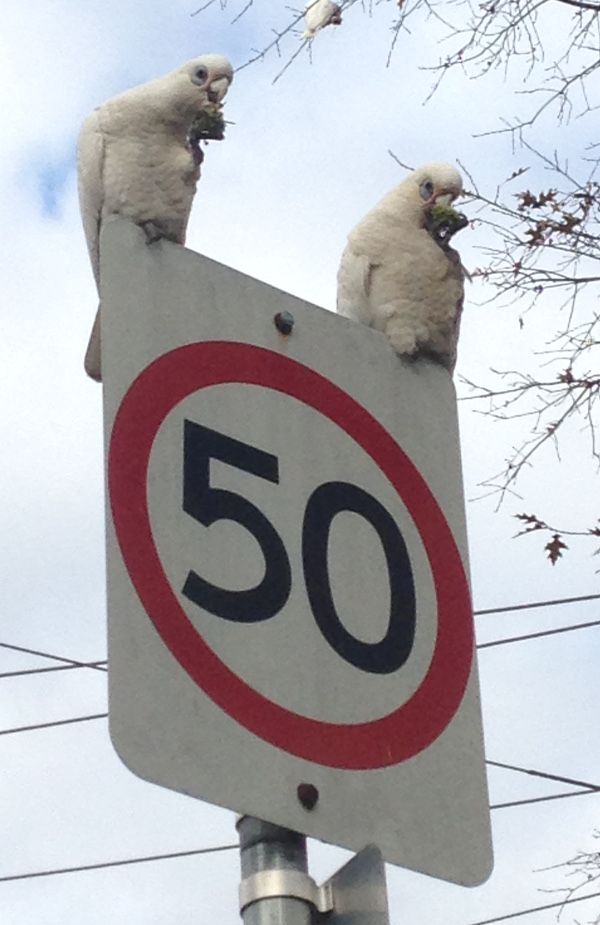
One day I couldn’t even drive down the street because it was carpeted with cockatoos picking through fallen gumballs and fighting each other over the seeds. They weren’t fazed in the slightest by the car horn or the car itself. It was as much an “OK, now I feel like I’m in Australia” moment as any kangaroo encounter.
“How you going?”: Yes, as I said, Australians do say “g’day, mate”. But the greeting you’ll hear much more often - in every store you go into, in every casual workplace chat - is “How you going?” (or “How are you going?”). My ear still registers it as a disorienting mashup of “how you doing?” and “how’s it going?” - even though, when you think about it, none of them make any more literal sense than any other.
Arvo, spruik, and ta: Everyday Aussie slang is like nothing you’ve heard from Crocodile Dundee.
“Arvo” means afternoon: “Got any time this arvo?”
To “spruik” (pronounced “sprook”) is to sell, tout, promote: “The prime minister was in Queensland to spruik his new climate plan.”
To “dob” means to snitch.
“Ta” just means “thank you”. As in, after I picked up a toddler’s wayward football and handed it to him, his mom told him to “Say ‘ta’.”
These are just a few of the most obvious examples that spring to mind. Again, none of this is worthy of comment in Australia. Words like these are absolutely unremarkable everyday speech.
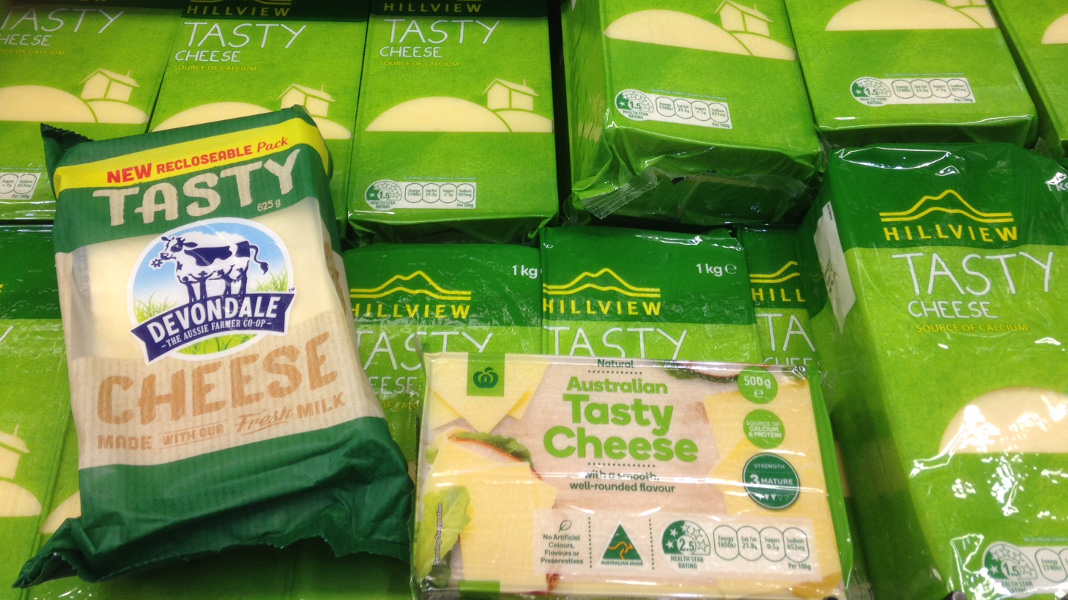
Tasty cheese: Not a value judgment: this is what they call their basic sandwich cheese, the one they use like Americans use American cheese. It’s a kind of semi-aged cheddar, always white in color, with a sharper, saltier flavor than American cheese. If you want it sharper, that’s called “extra tasty” or sometimes “extra bitey”. Presumptuousness of the name aside, it is pretty tasty cheese.
The Aussie burger: Australians still consider burgers the epitome of American food even though they are, if anything, more common in Melbourne than in Seattle. But there’s one burger they proudly lay claim to, usually listed on the menu as an “Aussie burger” or “burger with the lot.”
Take a burger. Add a slice or two of tasty cheese (makes sense). Then some bacon (English-style, but still, nothing weird about bacon on a burger). Next, a fried egg (hmm, a little eccentric, but not totally unheard of). What really makes it an Aussie burger is the final touch: a slice or two of purple, slimy, earthy-tasting beetroot.
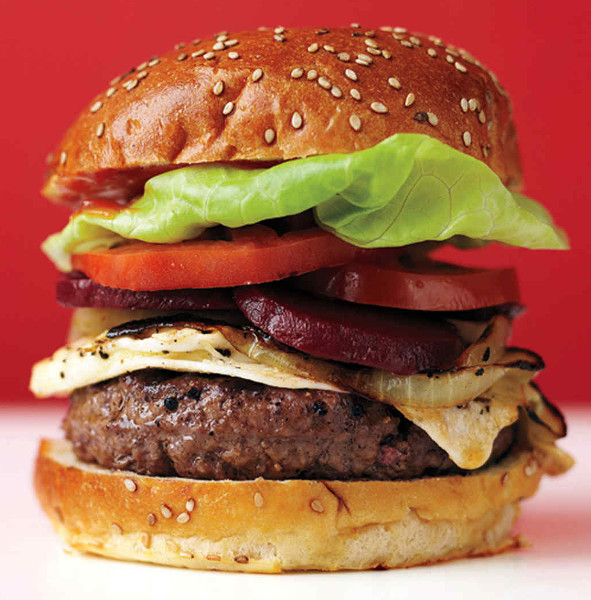
Frankly, on paper, beetroot sounds like a great way to ruin a burger. In practice, though, it’s pretty delicious.
Parm and a pot: The other great Aussie junk food entree is a chicken parma, or parm: a schnitzel (breaded chicken patty) topped with a slice of ham, tomato, and melted cheese. As with so many of the items on this list, I cannot stress enough how these are everywhere, often paired in a meal deal with a beer as “parm and a pot” in…
Hotels where nobody sleeps: Some Australian hotels are what Americans would call hotels: places where you rent rooms by the night. But in every suburb, every town, usually in one of the grandest buildings on one of the most prominent corners, you’ll find a different kind of “hotel”. These are enormous bars catering to high-volume mass-market revelry, with giant TV screens, video poker machines (pokies), and the cheapest food and beer around.
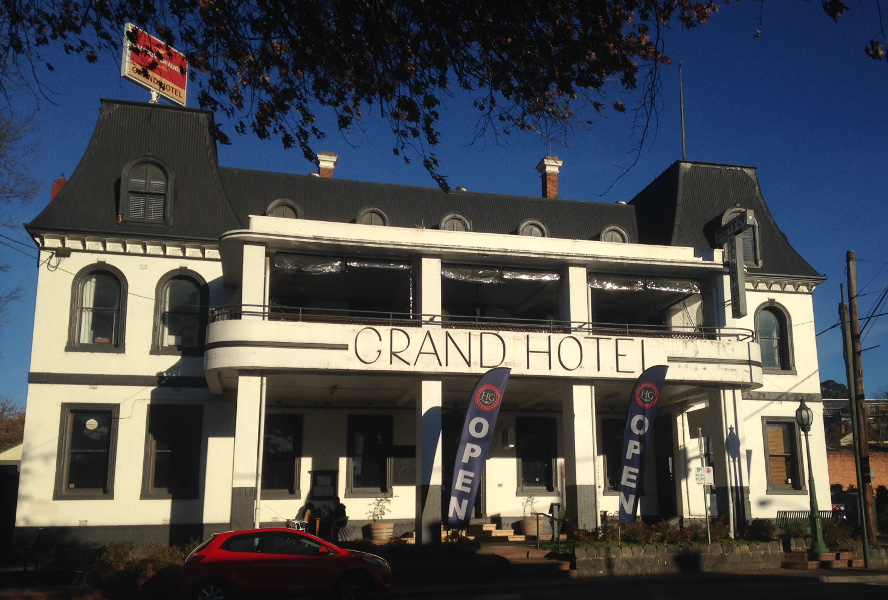
It’s the kind of place you can take the whole family for six hours on a Sunday: Mom and Dad get cheap drunk, Granny plays the pokies, and the kids stuff themselves with junk food, all for under a hundred bucks.
Showbags: This uniquely Australian retail phenomenon is like a fanboy Bag of Crap: a mystery bag of themed merchandise packaged and sold as a single unit, usually at a carnival (which they call a “show” here). The theme could be generic (glowsticks, or novelty pranks) or licensed (Doctor Who, Pokemon, Cadbury). Every Australian I’ve talked to thinks showbags are the most normal thing in the world; nobody else in my office has ever heard of them. I should bring the concept back to America and become the country’s first showbag billionaire…
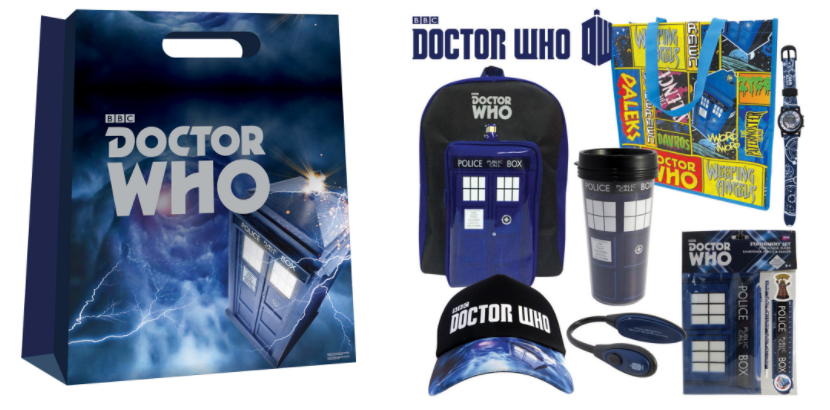
I haven’t even touched on “Christmas in July”, or all the things you can do at the post office, or Australia’s weird candy, or the fact that they don’t really call it candy. I won’t condescend to call Australia the “Bizarro USA” or whatever, but I just might think it every once in a while.
- 12 comments, 17 replies
- Comment
Love the stranger in a new land revelations. Fascinating.
Sounds as if you’re acclimating well.
And had never heard of gumballs with seeds. I just looked it up - there is such a thing as a gumball tree!
@KDemo really?

/image gumball tree
Weird.
I actually remember a candy gumball with stuff inside.

/image candy gumball with candy inside
@KDemo Our yard is full of gumball trees (sweetgum). Those balls are horrible to step on in bare feet.
@sammydog01 - Are you sure they’re not pod people pods? They look alien.
@KDemo I dunno but crafters like them.

@sammydog01 - Pretty sure the cockatoos have had their way with that one.
I watch a YouTuber from Australia that sews and always thought it strange that after completing a project, when trying it on, she would ask, “So how did I go?” instead of “how did I do?”
Now I get it. Thanks.
We stayed at a B&B in Sydney and every morning we went for a brisk walk with our hostess through the neighborhood to the park. The yards were always full of cockatoos pecking for seeds. One morning I pointed to a house with a large flock on the lawn and I told her that in the US those birds would sell for enough to buy that house. She was shocked to hear how much they sell for here.
@moondrake @jasontoon we own a rose-breasted cockatoo (beautiful grey except his chest which is …), native to Australia. Have had him about 20 years (expect 50-60 more). When my husband told some folks from Australia about the pet they looked at him strange. After a minute of “why are you excited”/“why are you confused” they explained that it would be like letting a pigeon sit on a perch in your living room.
@mollama After 9 years of relative bliss, we lost our 13 y/o female Umbrella Cockatoo about 5 years ago due to her having become egg bound, but we haven’t been able to move on to even thinking about getting another bird because she was so much our little girl, and we had hoped to pass her on to our youngest nephew when we passed [we’re past out 1/2 cent mark] given their life expectancy.
I’m happy for you that you have a boy, so at least that’s one less worry for you.
All that was preface to say:
Pigeons?!?!?!?- yeah, right- What pigeons are there that talk, clown, and love their owners?
We have decided that when/if we adopt another 'too or other hookbill, it will have to be a boy.
Ta,
PA
@mollama @PhysAssist my daughter has cockatoo keewee, his chest is semi naked. she got him a few months ago from a bird rescue. he’s 17, an attention hog. dances and screeches a lot! lol says hi, keewee, emma ( real loud, she was his original owners daughter, she must of got yelled at often) some other stuff… she and this bird are in love. lol
my husband raised pigeons when he was a teen. he loved those pigeons too.
@mollama Did you tell them that people keep pigeons as pets, breed and show them here?
@moondrake while it is true many keep pigeons, they usually do it in a coop on the roof or in the yard. They normally don’t buy ornate cages and stands for pigeons to put in the living room. There are exceptions, but it isn’t the same way Americans usually keep cockatoos. @physassist made a good point about talking etc too.
@mick Our Brandy had been owned by a hispanic family with the mom as her primary caregiver, she developed feather-picking when the mom went back to school and then work, so she sold her to us at age 3, which decreased, but did not cure the problem.


Unexpected quirks that came with her as a result of her early life were that forever after, when she got angry or excited, she swore loudly and rapidly in SPANISH, she preferred males and despised blondes [except for my SWMBO], and because she really thought it was funny, she would consistently chase my M-I-L around laughing evilly the whole time. Another likely effect [because she was her previous owner’s constant companion from daybreak til nightfall] was an extremely large and very often appropriately used vocabulary, [luckily, although she lost her initial Spanish accent gradually over the years, she never picked up cursing in English], including calling and whistling for our dogs [even though they only fell for it occasionally, when they did, the above-referenced evil laugh surfaced again…]
She was always very small for an umbrella- more like a rose-breasted in size, likely because as a baby, her growth was stunted because she was fed a very limited diet of mostly seeds.
You may be able to tell, that we miss her terribly even now, some 9 years later.
As for the burgers, eggs on them have become more common where I live. It’s actually quite good, especially when the yoke breaks. I think the beet root looks delicious on that burger. I love beets!
Our local minor league park always celebrates Christmas in July.

Chicken parm is only that widespread in Melbourne. It’s less of s cultural touchstone in the rest of the country.
Over the years I have had a food exchange with a friend in Australia. Love their candies! TimTams, Picnic bars, and Minties are really good. Cadbury Dairy Milk is not the same as here, I did a blind taste test where only one person of about a dozen chose the US version. Vegemite is horrible. Dairy Milk with Vegemite, on the other hand, is quite good.
In Australia they don’t have graham crackers, so no smores on the barbie. Hot sauce, Twinkies, and Reeses are a few other things I’ve sent.
@callow In the UK there’s something very similar to Vegemite called Marmite. Often used as a spread on toast, it is something akin to a steaming pile of zombie poo.
@ruouttaurmind I don’t remember the differences between the two, but I acquired a taste for Marmite while in England. My favorite: toast with a thin layer of Marmite and a thick layer of marmalade!
@thejackalope I never acquired a palate for it. Many there prefer Marmite drink with marmalade toast.
There isn’t much difference between Marmite or Vegemite. Fanciers will tell of subtle flavour differences. Like Coke vs. Pepsi. It’s all poxy to me.
Nothing about drop bears?

/image drop bears
/s
@narfcake Have a peek at this NatGeo article about the real drop bear
@ruouttaurmind Scary indeed:
Thylacoleo carnifex [literally pouch-lion butcher], or the “marsupial lion.”
…and the evidence shows that they were/could have been climbers…
“So much of prehistoric life was so strange that we could have never imagined those species if we hadn’t come across their remains. The drop bear is a rare case when our species, in jest, stumbled upon something real and just as scary as our imaginations can muster.” edit- much SCARIER than…
I feel like you could have completely made up one of these things and it’d be really hard to guess which one.
reading this made me smile. i thank you.
are you just visiting? or did you move to Australia?
anyways, i really liked it and i hope you write some more!
I truly enjoyed reading every post here. I have always wanted to go to the western outback of Australia. I’ve seen so much about the area and how it has everything a person would want to see. Tropical,waterfalls,desert ECT…,the only thing that bothers me is it’s famous for having the 10 most poisonous spiders and snakes. To me other than those issues I would love to see everything and talk to everyone I could including the aborigines. I would love to be honored enough to stay with them for a month or so. I’ve also heard that most Aussies are very kind and generous kinda like Texans. I want to go see the beauty of all Australia has to offer, to me there is nothing better than seeing places that are still untouched by human hands. Thank you for your post and may your lives be filled with beauty and happiness. Peace ✌ out
I went to Australia a while back. Our host said he was talking to an American and there was a language problem- the American was talking about pick-ups. Our host thought everyone in this guy’s town was getting lucky all the time and not just driving trucks. Great country- and the birds were amazing!
@sammydog01 Did you mean birds like chippies, or birds like like cockatoos? Given the first part of your post, either could be inferred…
I feel like one of the comic book shops here in NYC has a similar thing to the “showbag” idea sometimes. Forbidden Planet, I think?
Egg on a burger is pretty common here for Sunday hipster brunch if you want something savory. Haven’t seen the beet before, but now I gotta try it.